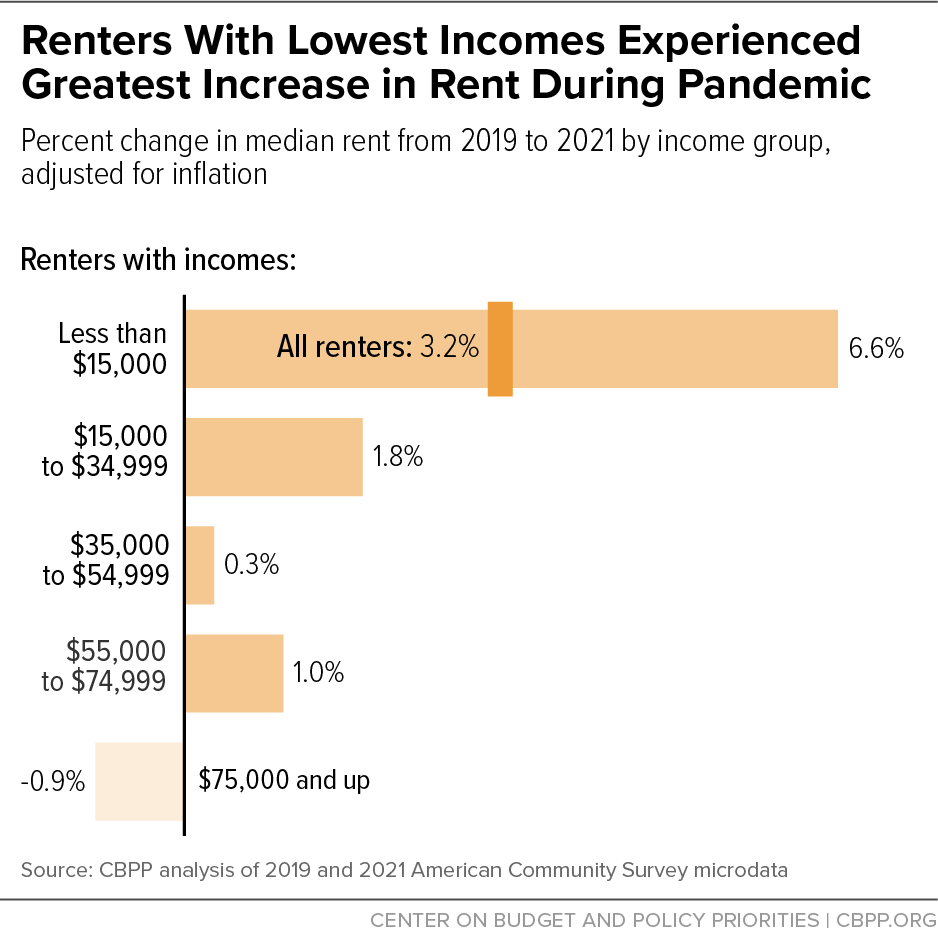BEYOND THE NUMBERS
As Congress finalizes fiscal year 2023 appropriations bills that among other things will fund critical Housing and Urban Development (HUD) programs and services, it should prioritize Housing Choice Vouchers and homelessness assistance programs to ensure that people with low incomes can afford safe, stable, and accessible housing.
Congress should provide:
- sufficient funding to cover the cost of renewing existing rental assistance through the Housing Choice Voucher program;
- increased funding for homelessness assistance programs at the House-passed level of $3.6 billion; and
- new resources for additional housing vouchers and services to broaden housing choice.
Both the House and Senate appropriations bills include $26.2 billion to renew existing vouchers. But the House version would also provide $1.1 billion for new vouchers, which would help an estimated 100,000 additional households afford safe, stable homes. Since vouchers are such an important but under-resourced rental assistance program, policymakers should include as much of this funding as possible in the final bill.
The Housing Choice Voucher program is the country’s largest rental assistance program, helping about 2.3 million households afford a home of their choice in the private market. Households generally contribute 30 percent of their incomes toward their rent and utility costs, and housing agencies subsidize the rest, up to a limit. Housing vouchers are highly effective at reducing homelessness, overcrowding, and housing instability.
Given the importance of the voucher program and persistent lack of resources, ensuring housing agencies have sufficient funding to maintain current assistance for households — and expand the number of households helped — should be a top priority. The House and Senate bills’ $26 billion for renewal funding should be enough to cover ongoing costs of current vouchers in 2023 despite rising rents and a voucher policy change designed to meet them. In September HUD announced an adjustment to the voucher program’s 2023 subsidy caps — known as fair market rents or FMRs — to keep pace with rapidly rising market rents. More accurate FMRs will help households with vouchers use their assistance more easily and in a larger range of neighborhoods.
Although the House and Senate bills were released before this policy change and don’t reflect its cost implications, most housing agencies have higher-than-normal funding reserves that, combined with the bills’ $26.2 billion, should be enough to maintain assistance to families who currently receive vouchers. Also, the full effects of the increased FMR costs will happen relatively slowly. The new FMR calculations largely apply to families who are receiving vouchers for the first time or looking for a new home, or who experience a rent increase when they renew their lease. (Next year, these new FMRs will be part of the baseline renewal costs, and Congress should provide enough funding for housing agencies through appropriations to maintain support for families with vouchers. Reserves should not be an ongoing funding source for renewals.)
But rather than merely maintain the voucher program, the 2023 appropriations bills are an opportunity to help it reach more households who need it. The House-passed bill includes $1.1 billion for new vouchers, which would help an estimated 100,000 additional households afford safe, stable homes. (The committee initially estimated that amount would create about 140,000 new vouchers, but with the new FMRs each voucher is more expensive, meaning 140,000 new vouchers could now cost closer to $1.5 billion.) Congress should include as close to that $1.1 billion as possible.
Having more vouchers in 2023 is critically important. Due to limited funding, only 1 in 4 eligible households receives any federal rental assistance. This lack of affordable housing assistance disproportionately affects Black, Latine, Asian and Pacific Islander, and American Indian and Alaska Native households because of long-standing inequities stemming from structural racism in housing, education, and employment.
Also, eviction rates, while down during much of the pandemic because of relief measures adopted, are again reaching pre-pandemic levels in many cities. Emergency rental assistance, which has helped many renters stay housed, is on pace to largely run out by year-end.
Finally, rising rents are impacting people with the lowest incomes the most. Though data reflecting the impact of recent rent increases in 2022 are not available, between 2019 and 2021 rent costs for people making less than $15,000 per year increased by 6.6 percent after adjusting for inflation, well above the rate increase for any other income group (see chart). In fact, rent increases for people at the highest income levels were below the overall inflation rate of nearly 6 percent. Higher rents for people with the lowest incomes forces them to make unimaginable choices between paying for rent, food, medicine, and other basic needs.
If funding for additional vouchers is enacted, Congress should set aside some of these new vouchers to function like the Emergency Housing Voucher and Stability Voucher programs, which serve people experiencing homelessness or fleeing domestic violence. To do so, lawmakers should give HUD the authority to set requirements and provide waivers specific to this set of vouchers to ensure those target populations can use them. This would allow agencies to continue and potentially expand the work they are doing under these existing programs. Reducing homelessness is an urgent goal since on a single night in January 2020 — for which we have the most recent available national data — more than 580,000 people experienced homelessness and the number of people living in tents and other unsheltered settings had increased for the fifth consecutive year.
The House-passed bill also includes $25 million for housing agencies to provide robust services to help interested voucher holders access homes in a wider range of neighborhoods. With this funding, housing agencies administering Housing Choice Vouchers could provide additional search support to families hoping to move to new neighborhoods, moving assistance resources such as security deposits or landlord incentive payments, and credit counseling to participating families.
Finally, the 2023 appropriations bill should also include additional assistance provided through Homeless Assistance Grants, which help people connect with the services and resources they need to obtain and maintain stable housing.

